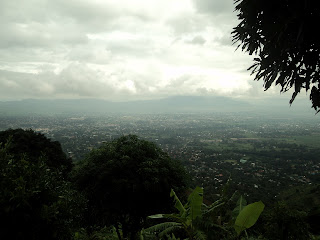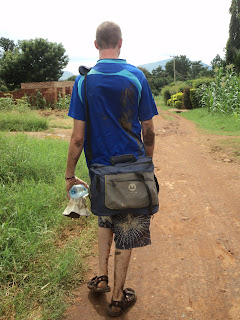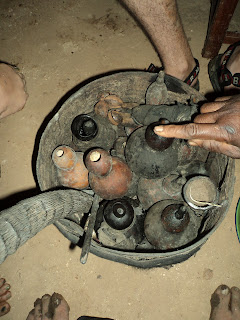Today the peace corps volunteers of the Morogoro region took an educational field trip up the mountain to consult a witch doctor, since according to an old Rough Guide to Tanzania there is a lady witch doctor who does divinations. Getting there involved hiking straight up the Uluguru mountains on a muddy, slick path that we could only walk up barefoot and even then tended to fall down a lot.
 |
| our destination: a village just under this peak |
 |
| the view of town from this elevation |
 |
| agroforestry: a circle of trees with crops in the center. Cuts down on erosion |
 |
| a more passable part of the path |
 |
| the aftermath of the trail |
When we finally reached the village (named a village, but seemingly a small collection of houses in the middle of nowhere and a pain to get there, so why they are there, I don't know) it turned out that the lady witch doctor had died several years ago, but her daughter sold traditional medicines sans divinations or anything.
 |
| the current lady witchdoctor (on the far right) and her family |
 |
| the awesome feathery witch doctory hat |
 |
A collection of gourds containing oil based medicines. These can be taken home on paper and brewed into teas. Note the disgustingness of the feet in the picture.
|
Having gotten so far, we decided we should actually ask what medicines are available. There are medicines to heal stomach aches, headaches, malaria ndegendege*, having too many children, having not enough children, and generally everything except HIV/AIDS. I asked for a love potion, just, you know, why not, but apparently it takes some time to prepare those, so one of my sitemates bought a magical root for stomachaches and some oil based goo to increase his fertility that he is now having second thoughts about taking.
*childhood seizures. Ndege means bird or airplane, and the idea is a child is looking up at a bird as the eyes roll up. Commonly thought to be just a form of malaria, but this lady insisted it is different.









